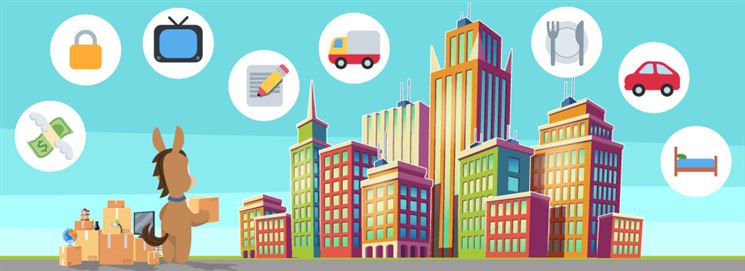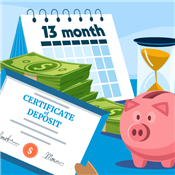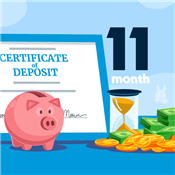First Apartment Budget Calculator
Moving into your first apartment is a huge (and expensive) step. Use this calculator to prepare your budget and keep your finances in check.
 |
Finding your first off-campus apartment is exciting! But it also comes with its fair share of stress.
Luckily, this apartment budget calculator can make the process more painless.
Once you know exactly how much you need to save up, finding and moving into a new spot can be a breeze. This checklist guides you through the entire process of moving into your new apartment.
How to use the First Apartment Budget Calculator
When you rent a new apartment, you're subject to a few one-time expenses:
- Application fee
- Security deposit
- Moving costs
- Furniture (couch, bed etc.)
- Household goods (dishware, linens, etc.)
You'll have to pay for some items before moving into the apartment, like moving costs, application fees, and security deposits. Other expenses, like furniture, can wait until you're more settled into your new digs. Once you're settled, you can anticipate these monthly expenses:
- Rent
- Utilities
- Transportation (bus fare, gas, car insurance, etc.)
- Food (groceries, restaurants, etc.)
- Fun and entertainment (streaming services, gym membership, etc.)
If you're unsure of the cost of some of these categories, no worries. Just use the default value as the average cost for an item.
Budgeting for your first apartment
Here's what you need to do to start your budget:
- Figure out your monthly take-home pay (income after taxes)
- Add up all of your monthly expenses
- Subtract your income expenses from your monthly take-home pay
Be sure to give yourself a small buffer for unexpected expenses like car repairs. And there you go - that's how much you have to spend on living expenses.
What is a good price for a first apartment?
A good deal for an apartment depends on your income, location and living needs. The right number is different for every person. But here's a general rule of thumb:
Calculate monthly net income (income after taxes) and see if you will need to spend 20%, 30% or 40% of your take-home pay on rent.
- If you're spending 20% - That's a pretty thrifty living situation. You could spend more on non-essentials or save more every month.
- If you're spending 30% - That's the sweet spot between comfort and affordability. You generally don't want to spend more than 30% because it'll impact your savings and ability to pay off debts.
- If you're spending 40% - That's a big splurge. It's hard to let go of your ideal home but you should keep an eye on your spending habits for day-to-day expenses.
Aim to spend around 30% of your monthly net income on your rent. Think of this as saving for the future - a new car, less debt or even a home to call your own.
Based on the rule to spend 30% of your income on rent, if you make $2,000 a month then you should spend up to $600 a month on rent.
Why do apartments want 3 times the rent?
When you first move into an apartment, you have to foot a lot of money to the landlord. Why do they request you provide "three times the rent"?
Landlords use this number as proof of income for potential tenants. 3x the income shows you can afford the place as a renter, and won't stop paying the rent. Landlords want to avoid the costly and time-consuming process of eviction as much as possible.
3x the rent consists of first and last month's rent + the security deposit.
The good news is that you don't need to pay the last month's rent when you move out as you fronted the bill upon moving in. And if you take good care of the apartment, you're likely to receive most of your security deposit back
Many landlords require that your annual gross income is at least 40 times your monthly rent. This is how they ensure you can afford the place and keep paying your rent. To calculate, divide your annual gross income by 40.
If you have roommates, you add all of your annual gross incomes and divide the sum by 40. You just want to see if that number is equal to more than your apartment's monthly rent.
Bottom line
As a first-time renter, budgeting for your first apartment is absolutely essential. You'll need to find a spot that is close to campus and has enough space for you and any roommates.
You should feel comfortable in your home and have it strike a balance between affordable and convenient.
When you first move in, you'll have a lot of costs for moving, furniture and other one-time expenses. But after that, your monthly costs will be much more manageable.
Amber Kong is a content specialist at CreditDonkey, a personal finance comparison and reviews website. Write to Amber Kong at amber.kong@creditdonkey.com. Follow us on Twitter and Facebook for our latest posts.
|
|
| ||||||
|
|
|












